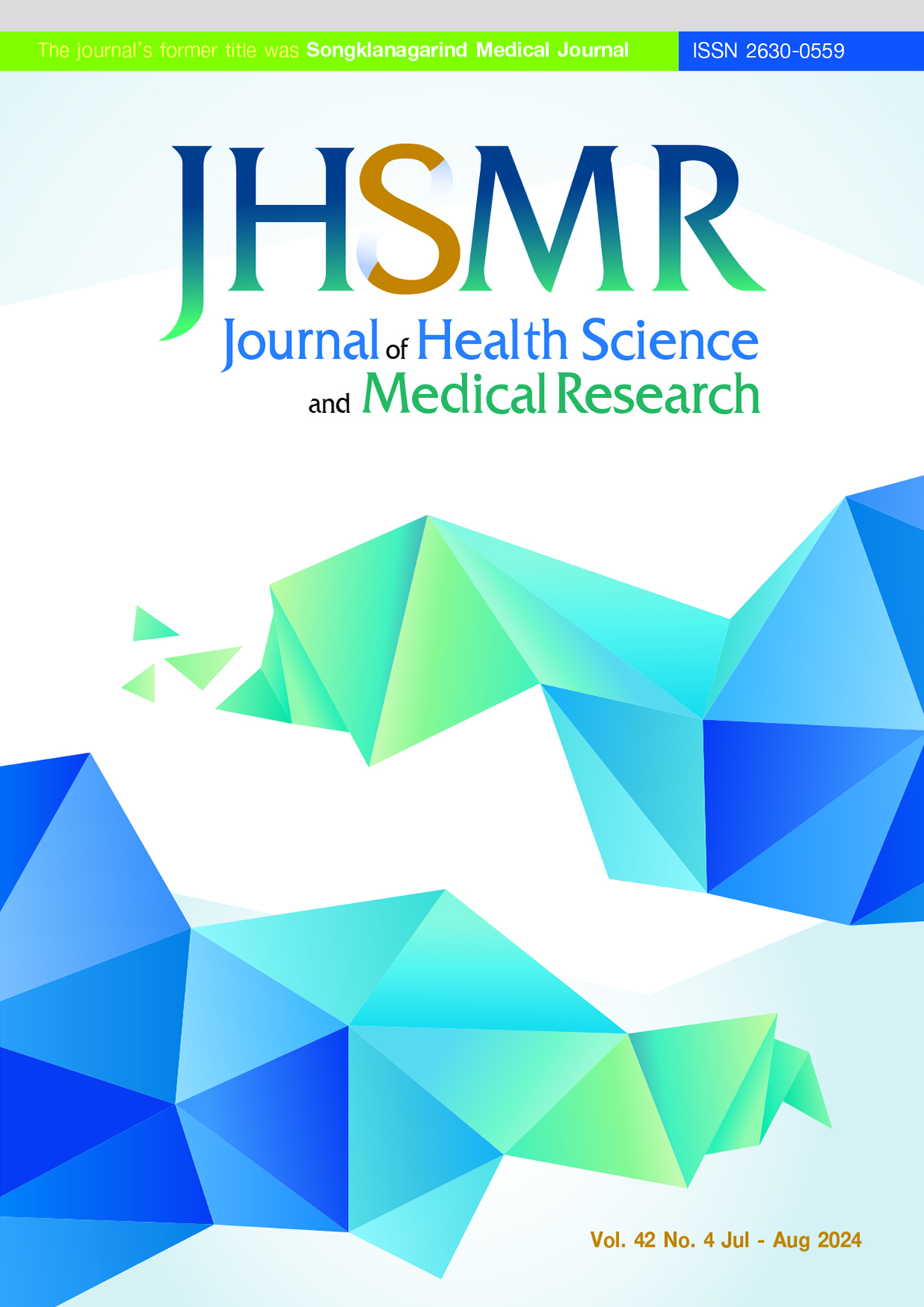Surgical Experience and Results of Retzius Sparing Robotic Assisted Laparoscopic Radical Prostatectomy: First Report in Thailand
DOI:
https://doi.org/10.31584/jhsmr.20241040Keywords:
prostate cancer, Retzius-sparing, robotic-assisted surgery, RS-RALRP, RS-RARPAbstract
Objective: To evaluate the outcomes and safety of the surgical technique Retzius-sparing robot-assisted laparoscopic radical prostatectomy (RS-RALRP), with prostatic cancer; the first report in Thailand.
Material and Methods: The authors conducted a retrospective analysis from the medical records of 100 patients who underwent RS-RALRP by a single surgeon; from 1st January 2021 until 31st May 2023, at Rajavithi Hospital. The authors analyzed demographic data, clinical staging, Gleason grade group, operative time, pathologic staging, positive surgical margin rate; postoperative continence recovery and postoperative complications.
Results: The median age was 71.34±6.84 years: mean total PSA was 17.16±17.55 ng/ml; with the majority in clinical T1 and T2. The mean operative time was 221.7±51.93 minutes, and the mean estimated blood loss was 312.30±264.55 ml. Of all patients, 88% did not require blood transfusion. The complication rate was 8%. The pathologic stages pT2 and pT3 or greater were 62% and 38%, respectively. Positive surgical margins (PSM) pT2 and pT3 were 14.5% and 63.2%. The postoperative continence recovery after RS-RALRP were 83%, 95%, 97%,100% and 100%: at 1, 3, 6, 9 and 12 months postoperatively, respectively.
Conclusion: RS-RALRP has a potential to become the new standard for prostate cancer treatment, with improved early continence and equivalent oncologic efficacy. The limitations of this study are the small number of population, which require prospective multicenter studies.
References
Siegel R, Naishadham D, Jemal A. Cancer statistics, 2013. CA Cancer J Clin 2013;63:11-30.
Lojanapiwat B. Urologic cancer in Thailand. Jpn J Clin Oncol 2015;45:1007–15. doi: 10.1093/jjco/hyv125.
Chen J, Oromendia C, Halpern JA, Ballman KV. National trends in the management of localized prostate cancer: a populationbased analysis 2004-2013. Prostate 2018;78:512–20.
Ficarra V, Novara G, Rosen RC, Artibani W, Carroll PR, Costello A, et al. Systematic review and meta-analysis of studies reporting urinary continence recovery after robot-assisted radical prostatectomy. Eur Urol 2012;62:405-17.
Roth AJ, Weinberger MI, Nelson CJ. Prostate cancer: quality of life, psychosocial implications and treatment choices. Future Oncol 2008:561–68. doi: 10.2217/14796694.4.4.561.
Umari P, Eden C, Cahill D, Rizzo M, Eden D, Sooriakumaran P. Retzius-sparing versus standard robot-assisted radical prostatectomy: a comparative prospective study of nearly 500 patients. J Urol 2021;205:780-90. doi: 10.1097/JU.0000000000001435.
Lee J, Kim HY, Goh HJ, Heo JE, Almujalhem A, Alqahtani AA, et al. Retzius sparing robot-assisted radical prostatectomy conveys early regain of continence over conventional robotassisted radical prostatectomy: a propensity score matched analysis of 1,863 patients. J Urol 2020;203:137-44. doi: 10.1097/JU.0000000000000461.
Galfano A, Di Trapani D, Sozzi F, Strada E, Petralia G, Bramerio M, et al. Beyond the learning curve of the Retzius-sparing approach for robot-assisted laparoscopic radical prostatectomy: oncologic and functional results of the first 200 patients with ≥1 year of follow-up. Eur Urol 2013;64:974-80.
Chang LW, Hung SC, Hu JC, Chiu KY. Retzius-sparing roboticassisted radical prostatectomy associated with less bladder neck descent and better early continence outcome. Anticancer Res 2018;38:345-51. doi: 10.21873/anticanres.12228.
Dalela D, Jeong W, Prasad MA, Sood A, Abdollah F, Diaz M, et al. A pragmatic randomized controlled trial examining the impact of the Retzius-sparing approach on early urinary continence recovery after robot-assisted radical prostatectomy. Eur Urol 2017;72:677–85.
Xu JN, Xu ZY, Yin HM. Comparison of Retzius-sparing robotassisted radical prostatectomy vs. conventional robot-assisted radical prostatectomy: an up-to-date meta-analysis. Front Surg 2021;8:738421. doi: 10.3389/fsurg.2021.738421.
Sayyid RK, Simpson WG, Lu C et al. Retzius sparing roboticassisted laparoscopic radical prostatectomy: a safe surgical technique with superior continence outcomes. J Endourol 2017;31:1244-50.
Barakat B, Othman H, Gauger U, Wolff I, Hadaschik B, Rehme C. Retzius sparing radical prostatectomy versus robot-assisted radical prostatectomy: which technique is more beneficial for prostate cancer patients (master study)? a systematic review and meta-analysis. Eur Urol Focus 20228:1060-71. doi: 10.1016/j.euf.2021.08.003.
Menon M, Dalela D, Jamil M, Diaz M, Tallman C, Abdollah F, et al. Functional recovery, oncologic outcomes and postoperative complications after robot-assisted radical prostatectomy: an evidence-based analysis comparing the Retzius sparing and standard approaches. J Urol 2018;199:1210–7.
Egan J, Marhamati S, Carvalho FLF, Davis M, O'Neill J, Lee H, et al. Retzius-sparing robot-assisted radical prostatectomy leads to durable improvement in urinary function and quality of life versus standard robot-assisted radical prostatectomy without compromise of oncologic efficacy: single surgeon series and step-by-step. Eur Urol 2021;79:839-57. doi: 10.1016/j.eururo.2020.05.010.
Downloads
Published
How to Cite
Issue
Section
License

This work is licensed under a Creative Commons Attribution-NonCommercial-NoDerivatives 4.0 International License.
























